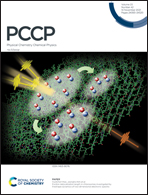On the origin of reactivity variation upon sequential ligation: the [Re(Cl)x]+/CH4 (x = 1–3) couples†
Abstract
The potential of [ReClx]+ (x = 1–3) in activating methane has been explored by using a combination of gas-phase experiments and high-level quantum calculations. When the number of Cl ligands increases, the reactivity towards methane activation varies accordingly. While [ReClx]+ (x = 1–2) are able to dehydrogenate methane by a three-state reactivity scenario, [ReCl3]+ shows inertness towards methane at ambient conditions. Furthermore, the product ion [ClRe(H)CH]+ of the [ReCl]+/CH4 couple could continue to activate methane and liberate molecular dihydrogen but another product ion [Cl2ReCH2]+ is unreactive with methane. Obviously, the nature and the number of ligands make a difference to the reactivity towards methane activation. The associated reaction mechanism and the electron origins for the rather different reactivities are discussed in detail. Finally and more importantly, instructive information concerning the rational design of Re-catalysts for methane conversion is obtained.
![Graphical abstract: On the origin of reactivity variation upon sequential ligation: the [Re(Cl)x]+/CH4 (x = 1–3) couples](/en/Image/Get?imageInfo.ImageType=GA&imageInfo.ImageIdentifier.ManuscriptID=D1CP03468E&imageInfo.ImageIdentifier.Year=2021)


 Please wait while we load your content...
Please wait while we load your content...